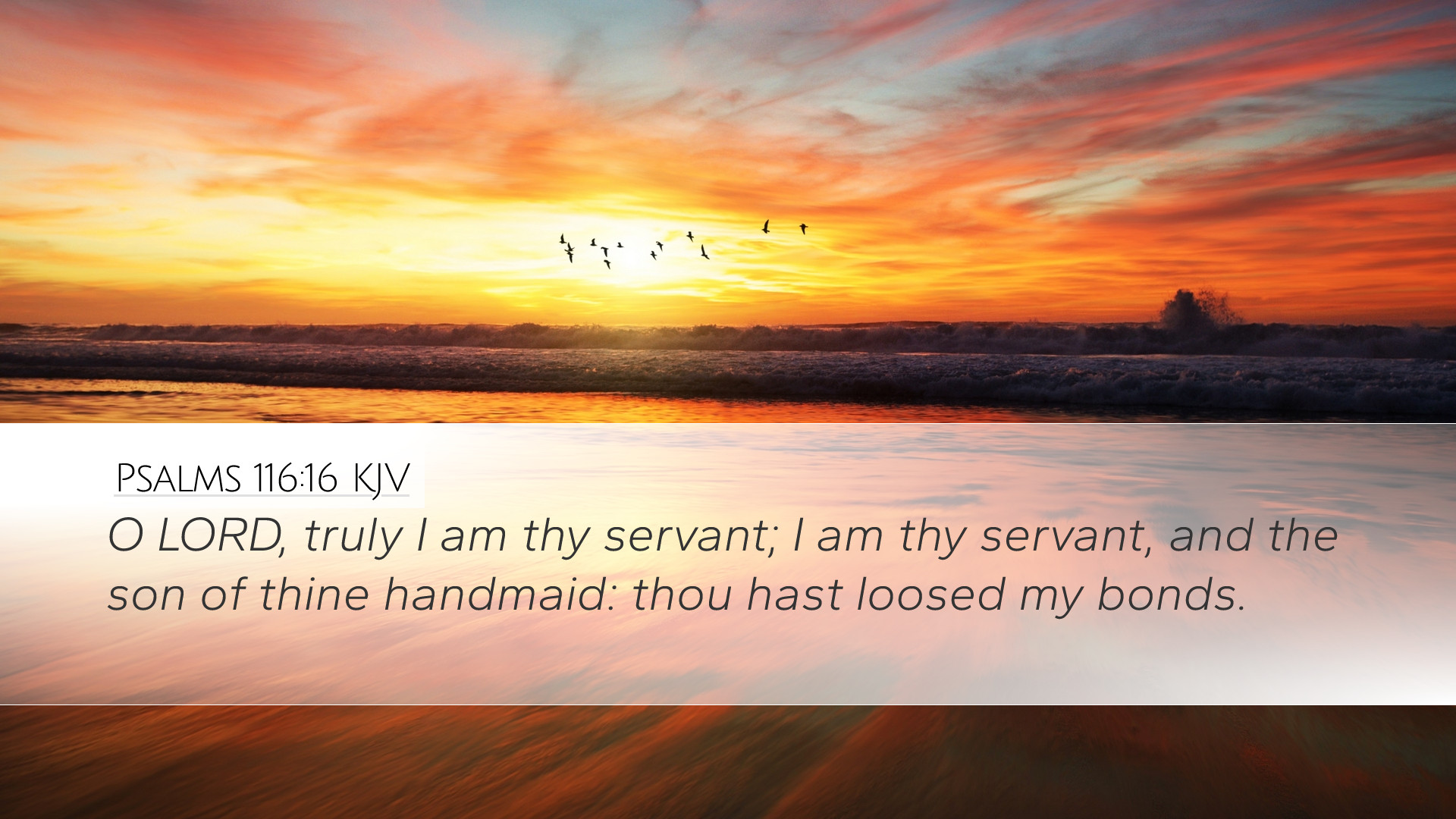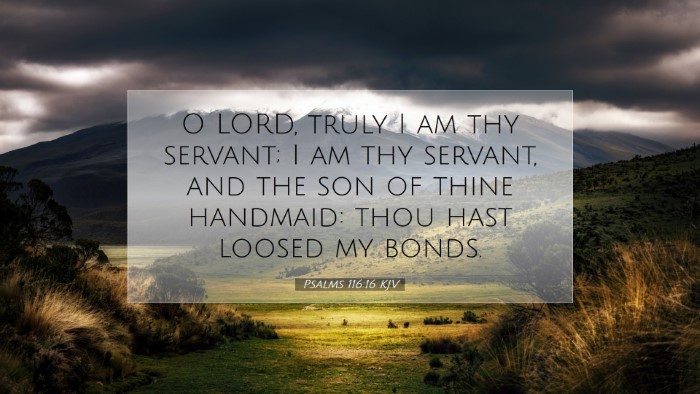Psalms 116:16 Commentary
Bible Verse: "O Lord, truly I am Your servant; I am Your servant, the son of Your maidservant; You have loosed my bonds."
Introduction
This verse encapsulates a profound declaration of servitude and gratitude towards God. In the context of Psalm 116, the psalmist expresses a deep sense of deliverance and a responsive commitment to serve the Lord. The insights gathered from various public domain commentaries provide a comprehensive understanding of the implications of servanthood in a believer's life.
Overview of Themes
- Servanthood: The psalmist emphasizes his identity as a servant of God.
- Gratitude: The acknowledgment of God’s deliverance is met with thankfulness.
- Redemption: The phrase "You have loosed my bonds" signifies liberation from distress.
Commentary Insights
1. Declaration of Servanthood
Matthew Henry: This verse illustrates the deep humility reflected in the psalmist's acknowledgment of being God's servant. Henry posits that such a declaration is not merely an expression of duty but one of heartfelt devotion. The repetition of "I am Your servant" emphasizes the sincerity and depth of the psalmist's commitment.
Albert Barnes: Barnes expounds on the historical context of servanthood in Israel, highlighting that being a servant of God reflects a position of honor. He notes that this servitude is both voluntary and joyful, identifying oneself as belonging to the Lord, which carries profound spiritual implications.
Adam Clarke: Clarke emphasizes the familial aspect of servanthood, where he mentions the "son of Your maidservant." This connection suggests a lineage of servitude, indicating that the psalmist is following in a tradition of faithful service, which infuses his commitment with historical significance.
2. Expression of Gratitude
Matthew Henry: The acknowledgment of being loosed from bonds is a form of thanksgiving. Henry interprets this liberation as not just a physical release but a spiritual one, highlighting that gratitude is a natural response to divine deliverance.
Albert Barnes: Barnes states that thankfulness is an essential aspect of worship. He interprets the act of serving God as an opportunity to express gratitude for the blessings received. This act of service is not out of obligation but as a response to the goodness of God.
3. Significance of Liberation
Matthew Henry: The phrase "You have loosed my bonds" serves as a reminder of God's redemptive power. Henry notes that deliverance from affliction is a recurring theme in the Psalms, showcasing the character of God as a liberator. It reassures believers of God's commitment to their freedom, both spiritually and emotionally.
Albert Barnes: Barnes delves deeper into the implications of being loosed from bonds. He emphasizes that such deliverance signifies a call to a new life of service and devotion. This liberation should transform how one lives, encouraging a continual commitment to God.
Adam Clarke: Clarke interprets the "bonds" as representing sin, distress, or any form of bondage. He suggests that liberation from these constraints is a gift from God, highlighting the importance of recognizing this freedom and responding with devoted service.
Theological Implications
This verse invites pastors and theologians to reflect on servanthood as a core aspect of the believer’s relationship with Christ. The recognition of being loosed from bonds points towards the greater theological narrative of salvation and redemption inherent in the Christian faith.
1. Servanthood in the New Testament
The New Testament reinforces the call to servanthood through the teachings of Jesus, who exemplified the ultimate servant-leader model. Christians are called to follow His example, striving for humility and a willingness to serve others, reflecting the heart of the psalmist in this passage.
2. The Role of Gratitude in Worship
Gratitude plays a critical role in the believer's walk with God. As seen in Psalms, song, and praise arise from hearts filled with thankfulness. Understanding God's past deliverances fuels the fire of worship and encourages an ongoing relationship characterized by gratitude.
Conclusion
Psalms 116:16 stands as a profound reminder for believers of their identity as servants of the Most High God. The weight of being loosed from bonds calls for a response of heartfelt service and deep gratitude. As we delve into this verse, may it inspire all—pastors, students, and scholars alike—to embody the spirit of servanthood in their daily lives, reflecting both the humility and the joyous liberation found in a relationship with God.


